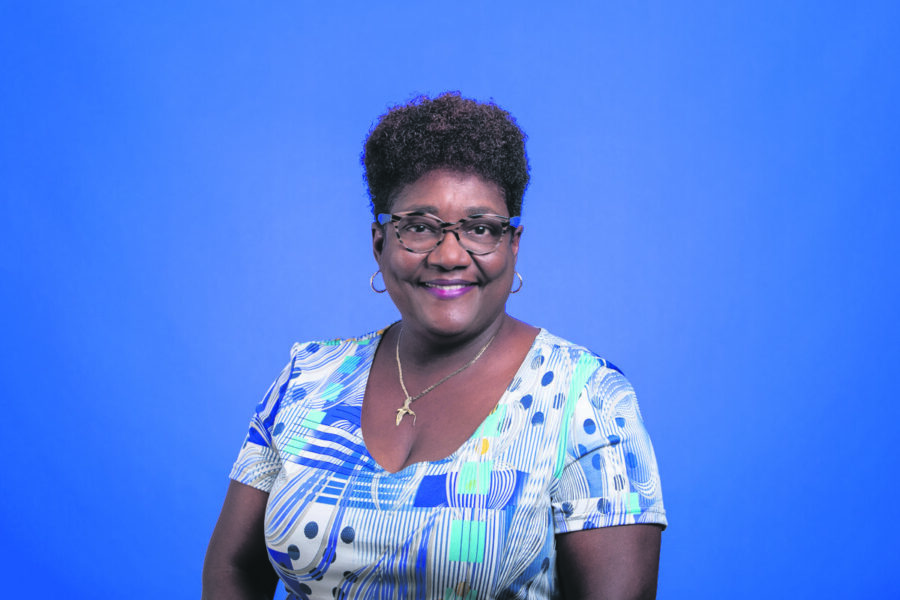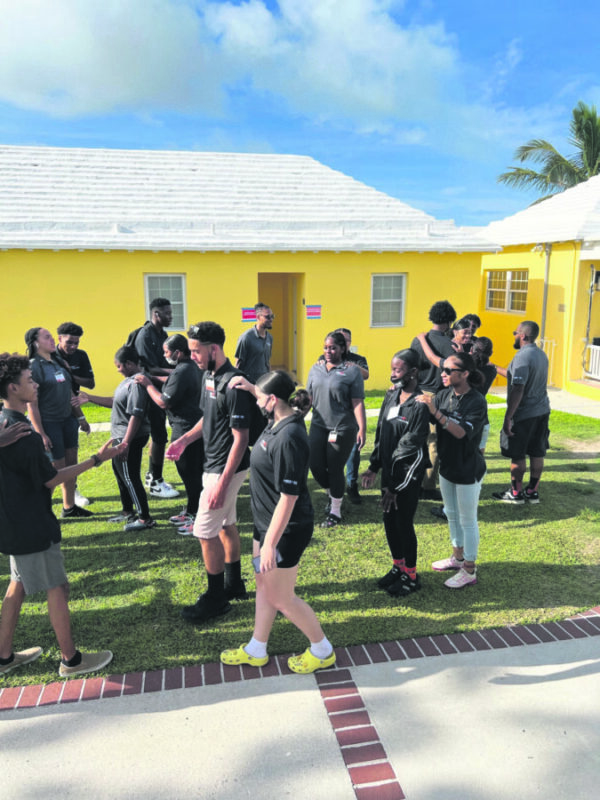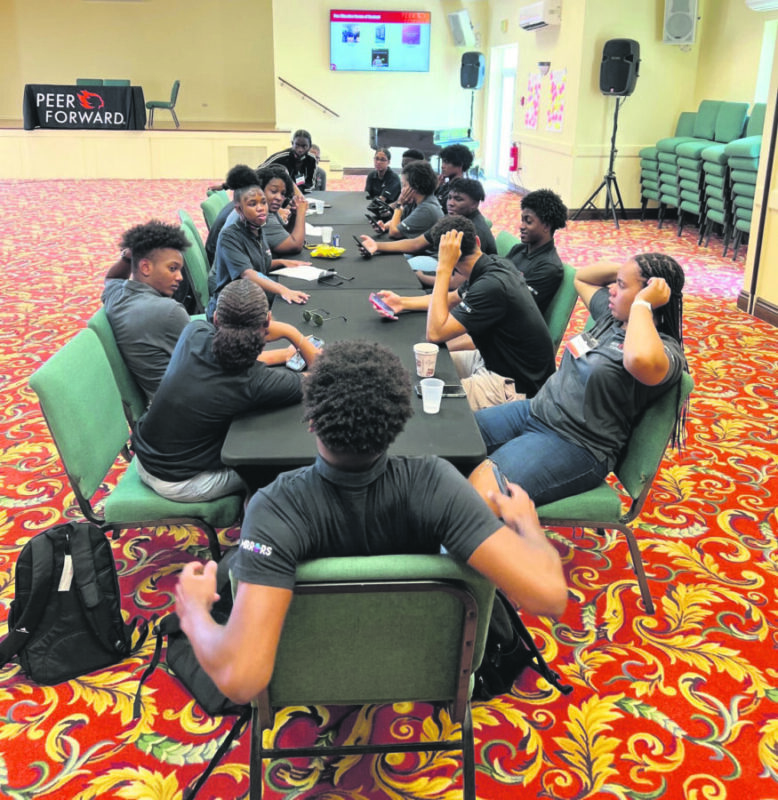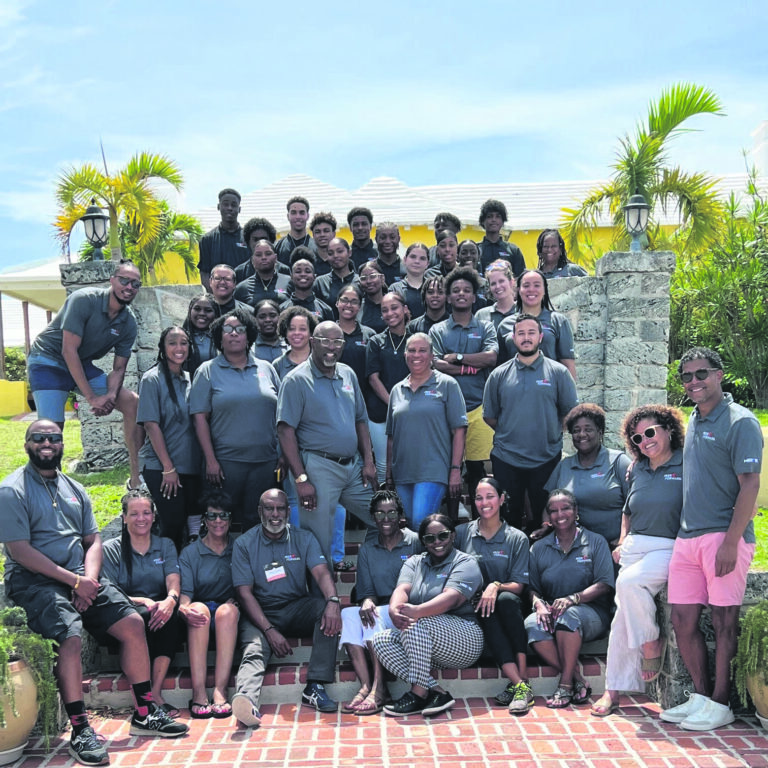Often when we think of peer pressure, the term has negative connotations. We think of it as something that encourages people, in particular young people, to do things they shouldn’t. But what if peer pressure could be used to encourage them to do things they should be doing? Such as having the ambition and motivation to go on to higher education?
The Mirrors PeerForward programme aims to do exactly that. It’s about using the power of peer pressure to help high school students, their families and their schools to encourage and prepare young people for college.

“The focus of the programme is peer leaders,” explained programme co-ordinator, Sandra Dill. “The greatest way to get a young person to do something is to ensure that another person is doing it. It’s peers influencing their peers.”
The programme, which is in its second year, is being run at CedarBridge Academy and the Berkeley Institute. Students are invited to volunteer to be peer leaders in the Spring of their junior year before undergoing a recruitment process.
The volunteers are interviewed by representatives from Mirrors, US organisation, PeerForward, and their school counsellors, and then selected. There are currently 28 peer leaders in total.
Once selected, the peer leaders are themselves trained, so they can return to school in their senior year, ready to advocate amongst their peers as well as support them.
“We start with a summer workshop,” continued Ms Dill. “In the summer workshop, these peer leaders get together and they learn about themselves – who they are, their leadership skills, and then they actually go through the college application and essay-writing process with college coaches so they know what’s required. It’s all about preparing themselves for college.”
 For the last two years, the summer workshop has taken place in Bermuda, but in 2023, successful peer leaders will attend the PeerForward retreat in Rochester, New York. This will be a full week of training and support alongside US students, which Ms Dill is particularly excited about: “Hopefully that will give them some more motivation and level of interest in how things are done,” she said.
For the last two years, the summer workshop has taken place in Bermuda, but in 2023, successful peer leaders will attend the PeerForward retreat in Rochester, New York. This will be a full week of training and support alongside US students, which Ms Dill is particularly excited about: “Hopefully that will give them some more motivation and level of interest in how things are done,” she said.
Once they return to school in September, they are then ready to begin sharing their knowledge and experience with their classmates. This is done through a variety of means including college awareness and application campaigns, along with activities to support those campaigns.
“They become the poster children for getting ready for college,” said Ms Dill. “They’re highly motivated to do this. They work with their high school advisors, who are their guidance counsellors, who are also trained by PeerForward.”
In addition to the introductory workshop, the peer leaders have two further workshops. One in October, focused on how to create college awareness, college application and scholarship application campaigns, and then a third in the spring about how to recruit the next cohort of peer leaders to take over from them when they leave.
PeerForward provides the leaders with 30 different campaign activities to choose from. A particularly successful one, said Ms Dill, was when the teachers decorated their doors according to the college they had attended.
“That creates interest in the colleges,” she explained. “The young people will have a questionnaire, or they’ll go and have a talk with their teachers about their experience. It’s the shared experience. It’s not just the peer leaders. The whole eco system in the school is around college preparation.”
The objective is to get each student to apply to at least three colleges. This is because research shows that if they apply to three or more, they’re more likely to go.
Another successful event run by peer leaders, with the support of their advisors, was a college application day at CedarBridge Academy:
“There was lots of buzz and excitement. It was organised chaos to watch the young people filling out their application forms, being supported by their peers. They’re very influential and supportive people. They’re truly advocating for them to get it done,” she said. “By the end of the day, a large percentage of the senior class had completed at least one application. That was amazing.”
 As part of the process, the peer leaders also maintain a dashboard, which acts as a scoreboard keeping track of where students have applied to, if they’ve applied for scholarships or if they’ve applied for employment – not everyone wants to go to college straight away. This means that if someone hasn’t applied to anywhere, peer leaders and counsellors can reach out to that person and offer their help and support.
As part of the process, the peer leaders also maintain a dashboard, which acts as a scoreboard keeping track of where students have applied to, if they’ve applied for scholarships or if they’ve applied for employment – not everyone wants to go to college straight away. This means that if someone hasn’t applied to anywhere, peer leaders and counsellors can reach out to that person and offer their help and support.
While the PeerForward programme is designed to benefit the whole school, it also helps the peer leaders develop vital life skills, including data management, marketing and secretarial: “They learn how to take notes, how to listen, how to present their documentation,” said Ms Dill.
It’s been under two years, but the programme is already showing signs of success.
“There is more college awareness and students are applying to college earlier,” said Ms Dill. “It’s about helping young people to apply and get into college, and that’s what’s happening. The other success is that they have a better appreciation for what’s required and are starting to become more dedicated to make it happen.”
The programme is also helping the high schools, in general, to become more focused on college preparation as well as graduation.
“This is not a stand-alone Mirrors programme,” she added. “It has to be done in collaboration with the schools. They come [to the workshops] and they collaborate strategically on how this can be run. When meetings can be held. When workshops can be held, who is selected, what the expectation is.”
Prior to the implementation of this programme, Ms Dill said that young people were so focused on meeting their graduation requirements, they sometimes struggled to find the time or motivation for college applications.
“It’s about changing culture in our community,” she said. “PeerForward is really focused on preparing students for the next step.”

